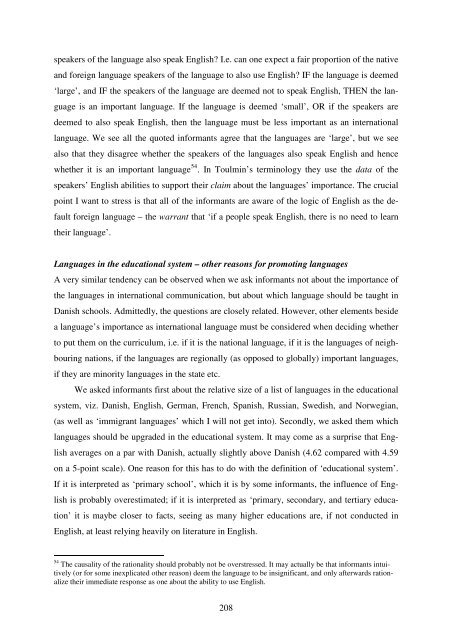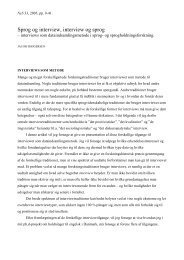Hør dog hvad de siger - Note-to-Self: Trials & Errors
Hør dog hvad de siger - Note-to-Self: Trials & Errors
Hør dog hvad de siger - Note-to-Self: Trials & Errors
You also want an ePaper? Increase the reach of your titles
YUMPU automatically turns print PDFs into web optimized ePapers that Google loves.
speakers of the language also speak English? I.e. can one expect a fair proportion of the native<br />
and foreign language speakers of the language <strong>to</strong> also use English? IF the language is <strong>de</strong>emed<br />
‘large’, and IF the speakers of the language are <strong>de</strong>emed not <strong>to</strong> speak English, THEN the lan-<br />
guage is an important language. If the language is <strong>de</strong>emed ‘small’, OR if the speakers are<br />
<strong>de</strong>emed <strong>to</strong> also speak English, then the language must be less important as an international<br />
language. We see all the quoted informants agree that the languages are ‘large’, but we see<br />
also that they disagree whether the speakers of the languages also speak English and hence<br />
whether it is an important language 54 . In Toulmin’s terminology they use the data of the<br />
speakers’ English abilities <strong>to</strong> support their claim about the languages’ importance. The crucial<br />
point I want <strong>to</strong> stress is that all of the informants are aware of the logic of English as the <strong>de</strong>-<br />
fault foreign language – the warrant that ‘if a people speak English, there is no need <strong>to</strong> learn<br />
their language’.<br />
Languages in the educational system – other reasons for promoting languages<br />
A very similar ten<strong>de</strong>ncy can be observed when we ask informants not about the importance of<br />
the languages in international communication, but about which language should be taught in<br />
Danish schools. Admittedly, the questions are closely related. However, other elements besi<strong>de</strong><br />
a language’s importance as international language must be consi<strong>de</strong>red when <strong>de</strong>ciding whether<br />
<strong>to</strong> put them on the curriculum, i.e. if it is the national language, if it is the languages of neigh-<br />
bouring nations, if the languages are regionally (as opposed <strong>to</strong> globally) important languages,<br />
if they are minority languages in the state etc.<br />
We asked informants first about the relative size of a list of languages in the educational<br />
system, viz. Danish, English, German, French, Spanish, Russian, Swedish, and Norwegian,<br />
(as well as ‘immigrant languages’ which I will not get in<strong>to</strong>). Secondly, we asked them which<br />
languages should be upgra<strong>de</strong>d in the educational system. It may come as a surprise that Eng-<br />
lish averages on a par with Danish, actually slightly above Danish (4.62 compared with 4.59<br />
on a 5-point scale). One reason for this has <strong>to</strong> do with the <strong>de</strong>finition of ‘educational system’.<br />
If it is interpreted as ‘primary school’, which it is by some informants, the influence of Eng-<br />
lish is probably overestimated; if it is interpreted as ‘primary, secondary, and tertiary educa-<br />
tion’ it is maybe closer <strong>to</strong> facts, seeing as many higher educations are, if not conducted in<br />
English, at least relying heavily on literature in English.<br />
54 The causality of the rationality should probably not be overstressed. It may actually be that informants intuitively<br />
(or for some inexplicated other reason) <strong>de</strong>em the language <strong>to</strong> be insignificant, and only afterwards rationalize<br />
their immediate response as one about the ability <strong>to</strong> use English.<br />
208



